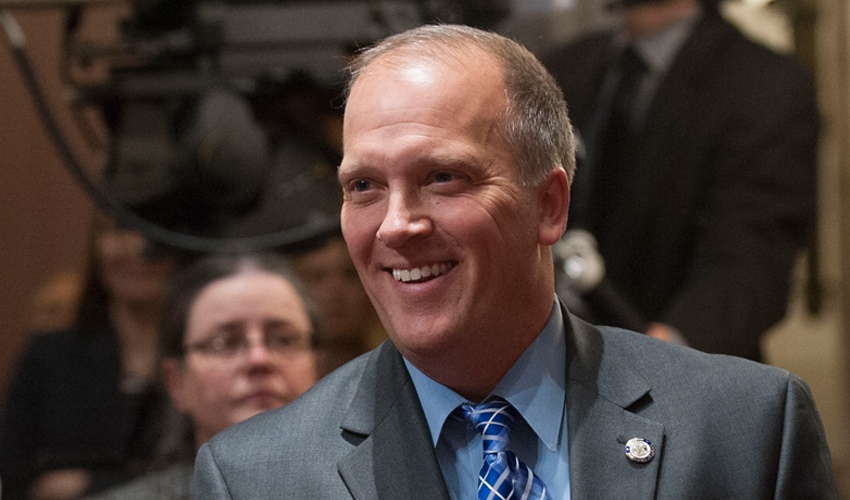Experts Question Schimel’s School Safety Grants
Sending mental health professionals to training designed for security officers?
The State Department of Justice should re-think its decision to require school districts receiving school safety grants to send teachers to mental health training designed for police officers and to participate in new, vaguely defined threat reporting activities, a group of mental health organizations say.
“I really hope there is an opportunity to correct the places where we’re headed toward unintended consequences,” Joanne Juhnke, policy director of Wisconsin Family Ties (WFT), said Tuesday. Wisconsin Family Ties is a statewide, parent-run organization in Wisconsin working with families that include children with social, emotional or behavioral challenges.
WFT, along with Grassroots Empowerment Project, Kids Forward, Mental Health America of Wisconsin, NAMI Wisconsin, and the Wisconsin Association for Marriage & Family Therapy wrote to Attorney General Brad Schimel raising questions about the grant’s requirements. Schimel’s office is administering the grants.
The groups recommended that Schimel’s shop “consult with relevant stakeholder groups including advocacy organizations with expertise in youth mental health.”
Under the state’s grant requirements, participating districts would establish SSITs to perform “ongoing violence-related threat assessments, behavior monitoring, and intervention” and would track, monitor, assist, and intervene with at-risk youth, according to DOJ’s grant application instructions.
The grant will require participating school districts to send 10 percent of their teachers and counselors to a 12-hour training in adolescent mental health, though the training was not designed for them.
“Although it does not appear in the grant materials, the full title of the training is ‘Adolescent Mental Health Training for School Resource Officers,’ and is the only approved training for this element of the grant,” the groups’ letter said. The target audience for the training is “school resource officers, security personnel, administrators, disciplinary staff, and treatment providers.”
“Requiring teachers to undergo training in adolescent health, delivered by law enforcement and designed with a juvenile justice perspective reinforces unfounded linkages between mental health challenges and crime and encourages teachers to view themselves as ‘disciplinary staff’ in their response,” the letter said.
Other available training would be more appropriate, the organizations said.
At issue is the second round in a grant process designed to award $100 million in school safety improvement grants. About $48 million will be awarded. Individual awards will range from $10,000 to $2.5 million, according to Department of Justice grant application information. School districts are required to submit their applications by Aug. 30 and project implementation will start Oct. 1.
Juhnke, in an interview, said the grant also requires information about potential threats to be entered “into databases about which we know practically nothing.”
The grant application instructions do not say whether school districts would supply general, district wide aggregate data or information about specific students and perceived threats.
It says only that new School Safety Intervention Teams (SSIT) would “report VRA [Violence Risk Assessment] data from specific, plausible, and imminent threats to the DOJ utilizing DOJ reporting form,” but does not provide a copy of the form or describe it.
WJI asked DOJ for a copy of the form Tuesday, but did not receive a response.
The Department of Justice also would require winning districts to “participate in and promote the DOJ confidential reporting application or tip line, when this is developed and deployed.”
Again, DOJ provides no information about the tip line or how it would function.
The State Legislature in March approved a bill requiring teachers, school administrators, school counselors, other school employees, physicians, and other medical and mental health professionals to report school safety threats to law enforcement.
The grant is asking that “school districts commit themselves to processes that haven’t been created,” she said.
The new law does not require development of a new reporting system, she said.
The mental health groups, in their letter, said the tip line “risks promoting a culture of suspicion, adding to stigma regarding mental health challenges and further discouraging students and families from seeking help.”
Many questions about the system remain, they said.
“What would be the benefit over and above any existing mechanisms for dealing with threats at school?” the letter asked. “Is there an evidence base for the benefits and drawbacks of such a system? What would be the threshold for reporting? Who would have access to the data? How long would the data be maintained? Would there be an appeal procedure for having reports removed?”
Juhnke said it was important to recognize and stop any actual school threat, but “we’re spiralling off in ill-defined directions from that.”
Gretchen Schuldt writes a blog for Wisconsin Justice Initiative, whose mission is “To improve the quality of justice in Wisconsin by educating the public about legal issues and encouraging civic engagement in and debate about the judicial system and its operation.






















This result is all too predictable. Brad Schimel, like his patron Scott Walker, seems to view his position as a means to hand out largesse, whether it be appropriate or not. And in this case, it sounds like it would be detrimental. The failure to consult and listen to stakeholders, whether they be teachers, students, incarcerated youth, prison guards, people living near CAFOs, or so many others, is a feature of this administration. It signals an attitude of “We don’t care about your world, just about how we can impose our world view.” November can’t come soon enough.